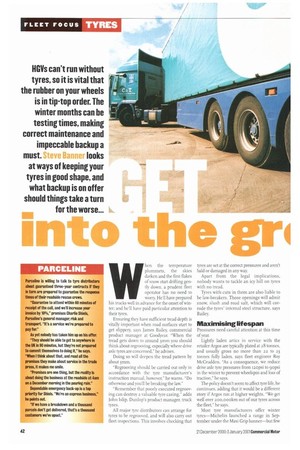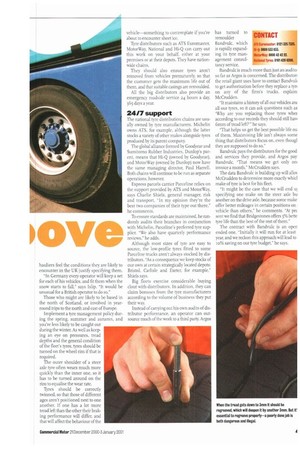the
Page 44

Page 45

If you've noticed an error in this article please click here to report it so we can fix it.
gr4 "we When the temperature plummets, the skies darken and the first flakes of snow start drifting gently down, a prudent fleet operator has no need to worry. He'll have prepared his trucks well in advance for the onset of winter; and he'll have paid particular attention to their tyres.
Ensuring they have sufficient tread depth is vitally important when road surfaces start to get slippery, says James Bailey, commercial product manager at Goodyear. 'When the tread gets down to around 3mm you should think about regrooving, especially where drive axle tyres are concerned," he advises.
Doing so will deepen the tread pattern by about 3mm.
"Regrooving should be carried out only in accordance with the tyre manufacturer's instruction manual, however," he warns. "Do otherwise and you'll be breaking the law."
"Remember that poorly executed regrooving can destroy a valuable tyre casing," adds John Islip, Dunlop's product manager, truck tyres.
All major tyre distributors can arrange for tyres to be regrooved, and will also carry out fleet inspections. This involves checking that tyres arc set at the correct pressures and aren't bald or damaged in any way.
Apart from the legal implications, nobody wants to tackle an icy hill on tyres with no tread.
Tyres with cuts in them are also liable to be law-breakers. Those openings will admit snow, slush and road salt, which will corrode the tyres' internal steel structure, says Bailey.
Maximising lifespan
Pressures need careful attention at this time of year.
Lightly laden artics in service with the retailer Argos are typically plated at 28 tonnes, and usually gross no more than 22 to 23 tonnes fully laden, says fleet engineer Roy McCrudden. As a consequence, we reduce drive axle tyre pressures from f2opsi to 9opsi in the winter to prevent wheelspin and loss of traction," he says.
The policy doesn't seem to affect tyre life, he continues, adding that it would be a different story if Argos ran at higher weights. "We get well over 2 oo,000km out of our tyres across the fleet," he says.
Most tyre manufacturers offer winter tyres—Michelin launched a range in September under the Maxi Grip banner—but few hauliers feel the conditions they are likely to encounter in the UK justify specifying them.
"In Germany every operator will keep a set for each of his vehicles, and fit them when the snow starts to fall," says Islip. "It would be unusual for a British operator to do so."
Those who might are likely to be based in the north of Scotland, or involved in yearround trips to the north and east of Europe.
Implement a tyre management policy during the spring, summer and autumn, and you're less likely to be caught out during the winter. As well as keeping an eye on pressures, tread depths and the general condition of the fleet's tyres, tyres should be turned on the wheel rim if that is required.
The outer shoulder of a steer axle tyre often wears much more quickly than the inner one, so it has to be turned around on the rim to equalise the wear rate, Tyres should be correctly twinned, so that those of different ages aren't positioned next to one another. If one has a lot more tread left than the other their braking performance will differ, and that will affect the behaviour of the vehicle--something to contemplate if you're about to encounter sheet ice.
Tyre distributors such as ATS Eurornaster, Motorway, National and Hi-Q can carry out this work on your behalf, either at your premises or at their depots. They have nationwide chains.
They should also ensure tyres aren't removed from vehicles prematurely, so that the customer gets the maximum life out of them. and that suitable casings are remoulded.
All the big distributors also provide an emergency roadside service 24 hours a day. 365 days a year.
24/7 support
The national tyre distribution chains are usually owned by tyre manufacturers. Michelin owns ATS, for example, although the latter stocks a variety of other makes alongside tyres produced by its parent company.
The global alliance formed by Goodyear and Sumitomo Rubber Industries, Dunlop's parent, means that Hi-Q (owned by Goodyear), and MotorWay (owned by Dunlop) now have the same managing director. Paul Harrell. Both chains will continue to be run as separate operations, however,
Express parcels carrier Pa rceline relies on the support provided by ATS and MotorWay, says Charlie Shiels, general manager, risk and transport. "In my opinion they're the best two companies of their type out there," he comments.
To ensure standards are maintained, he randomly audits their branches in conjunction with Michelin. Parceline's preferred tyre supplier. "We also have quarterly performance reviews," he adds.
Although most sizes of tyre are easy to source, the low-profile tyres fitted to some Parceline trucks aren't always stocked by distributors. "As a consequence we keep stocks of our own at certain strategically located depots: Bristol, Carlisle and Exeter, for example," Shiels says.
Big fleets exercise considerable buying clout with distributors. In addition, they can claim bonuses from the tyre manufacturers according to the volume of business they put their way.
Instead of carrying out his own audits of distributor performance, an operator can outsource much of the work to a third party. Argos has turned to remoulder
Bandvulc, which ATS Euroniaster: 0121 325 7325.
is rapidly expand0800 533 833.
ing its tyre mankletorWay: 0800 42 42 22.
agement consulNational Tyres: 0101 429 8200. tancy service.
Bandvulc is much more than just an audito so far as Argos is concerned. The distributor: the retail giant uses have to contact Bandvul( to get authorisation before they replace a tyn on any of the firm's trucks, explain: McCnidden.
"It maintains a history of all our vehicles am all our tyres, so it can ask questions such as 'Why are you replacing those tyres wher according to our recOrds they should still ha‘l Gmm of tread left?'" he says.
That helps us get the best possible life ou of them. Maximising life isn't always some thing that distributors focus on, oven thougl they are supposed to do so."
Bandvulc pays the distributors for the good and services they provide, and Argos pay Bandvulc. "Thai means we get only on invoice a month," McCnidclen says.
The data Bandvulc is building up will alloy McCrudden to determine more exactly whicl make of tyre is best for his fleet.
"It might be the case that we will end uj specifying one snake on the steer axle bu another on the drive axle, because some make offer better mileages in certain positions on vehicle than others," he comments. "At prc sent we find that Bridgestones offers 5% bette tyre life than the best of the rest of them."
The contract with Bandvulc is an open ended one. "Initially it will run for at least year, and we reckon this approach will lead to ro% saving on our tyre budget," he says.








































































































































